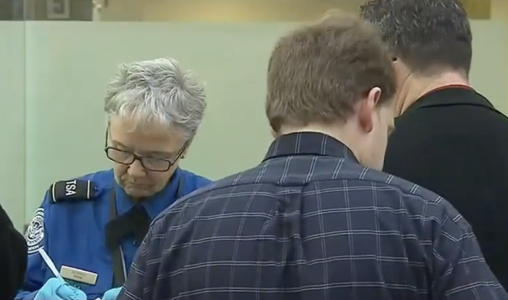TSA PreCheck scam warning: Travelers urged to watch for fake renewal websites
By
Veronica E.
- Replies 0
If you’re someone who’s traveled in the last few years, you likely know the appeal of TSA PreCheck.
It’s the express lane through airport security—no need to remove your shoes, belt, or laptop, and the lines move faster.
That’s why millions of Americans have signed up or renewed their membership in the Trusted Traveler program.
But with its popularity has come a new wave of scams designed to trick unsuspecting travelers out of their money and personal information.
According to the TSA, the latest scheme involves fake websites and emails that look official—but lead straight to fraud.

A familiar convenience, now targeted by scammers
TSA PreCheck has become a must-have for many frequent flyers, especially older adults who appreciate shorter lines and less hassle at security.
But its growing popularity has also made it a ripe target for fraud.
Scammers have created highly convincing lookalike websites, often promoted through search engines or links in emails, that claim to help travelers sign up or renew their PreCheck status.
These sites collect personal data and charge “application fees”—sometimes even more than the official price—without actually submitting anything to TSA.
Also read: He promised love, she lost her home: How a fake romance led to a $1.5M scam targeting seniors across state lines
Here’s how the scam works
The scam starts either when someone searches for TSA PreCheck online and ends up on a fraudulent site, or when they receive an email that appears to come from the TSA, Homeland Security, or a travel agency.
The message usually urges the person to act quickly, claiming their membership is about to expire or offering a “faster” application process.
Once on the fake site, victims are asked to provide payment information and sensitive personal details.
Many only realize something’s wrong when they get to the airport and find out they’re not actually enrolled—or when unauthorized charges appear on their bank statements.
Also read: Watch out for this "how are you" message—It could be a scam in disguise
Why PreCheck is a tempting scam target
There are a few key reasons this scam works:
Also read: Could your next hotel reservation be at risk? What travelers need to know about this growing scam
Official TSA reminders and red flags to watch for
To help travelers avoid being duped, the TSA has shared several important reminders:
Also read: Amazon warns Prime customers of rise in scam attempts: What to know and how to stay safe
What to do if you think you’ve been scammed
If you suspect you’ve fallen for a TSA PreCheck scam:
Also read: AI clones daughter's voice in chilling scam – Could your family be next?
Extra safety tips for frequent flyers
Cybersecurity experts recommend using credit cards for online purchases, since they often offer better fraud protection than debit cards.
You can also enable two-factor authentication on travel and payment accounts to reduce your risk of unauthorized access.
And don’t forget to share this warning with any friends or family members who travel—especially older adults or those less familiar with online scams.
As more travel services move online, scams like this are likely to become more common.
But staying informed and cautious is the best way to stay protected.
Whether you’re a seasoned traveler or just planning your next vacation, double-checking URLs, avoiding email links, and using trusted sources can help ensure your journey stays stress-free—from check-in to landing.
Read next: Are mysterious packages showing up at your door? Here’s what USPS wants you to be aware of

Have you or someone you know encountered a suspicious PreCheck renewal site or email? Share your experience to help others avoid these scams. Safe travels and stay alert!
It’s the express lane through airport security—no need to remove your shoes, belt, or laptop, and the lines move faster.
That’s why millions of Americans have signed up or renewed their membership in the Trusted Traveler program.
But with its popularity has come a new wave of scams designed to trick unsuspecting travelers out of their money and personal information.
According to the TSA, the latest scheme involves fake websites and emails that look official—but lead straight to fraud.

Scammers are targeting travelers with fake TSA PreCheck websites and phishing emails. Photo source: YouTube / Arizona’s Family (3TV / CBS 5).
A familiar convenience, now targeted by scammers
TSA PreCheck has become a must-have for many frequent flyers, especially older adults who appreciate shorter lines and less hassle at security.
But its growing popularity has also made it a ripe target for fraud.
Scammers have created highly convincing lookalike websites, often promoted through search engines or links in emails, that claim to help travelers sign up or renew their PreCheck status.
These sites collect personal data and charge “application fees”—sometimes even more than the official price—without actually submitting anything to TSA.
Also read: He promised love, she lost her home: How a fake romance led to a $1.5M scam targeting seniors across state lines
Here’s how the scam works
The scam starts either when someone searches for TSA PreCheck online and ends up on a fraudulent site, or when they receive an email that appears to come from the TSA, Homeland Security, or a travel agency.
The message usually urges the person to act quickly, claiming their membership is about to expire or offering a “faster” application process.
Once on the fake site, victims are asked to provide payment information and sensitive personal details.
Many only realize something’s wrong when they get to the airport and find out they’re not actually enrolled—or when unauthorized charges appear on their bank statements.
Also read: Watch out for this "how are you" message—It could be a scam in disguise
Why PreCheck is a tempting scam target
There are a few key reasons this scam works:
- TSA PreCheck is popular—more than 19 million people are enrolled, so scammers have a large pool of potential victims.
- The service costs $78 for a five-year membership, which is low enough that people don’t always question the charge but high enough to be worthwhile for criminals.
- Many travelers are eager to renew quickly and may not notice small red flags in a rush to secure their status.
Also read: Could your next hotel reservation be at risk? What travelers need to know about this growing scam
Official TSA reminders and red flags to watch for
To help travelers avoid being duped, the TSA has shared several important reminders:
- The official TSA PreCheck website is tsa.gov/precheck. Any other site claiming to offer sign-up or renewal may be fraudulent.
- The TSA will never request personal information or payment via email.
- If you receive an email prompting you to click a link, don’t do it—instead, go directly to the TSA site by typing in the address.
- Watch out for misspellings, strange email domains, or unexpected requests for payment outside the normal TSA process.
- PreCheck does not offer “skip the interview” options or faster processing for extra fees.
Also read: Amazon warns Prime customers of rise in scam attempts: What to know and how to stay safe
What to do if you think you’ve been scammed
If you suspect you’ve fallen for a TSA PreCheck scam:
- Contact your bank immediately to report any unauthorized charges.
- Change any passwords associated with the account you used, especially if you reused them elsewhere.
- File a complaint with the TSA and the Federal Trade Commission (FTC).
- Monitor your credit for suspicious activity in the weeks that follow.
Also read: AI clones daughter's voice in chilling scam – Could your family be next?
Extra safety tips for frequent flyers
Cybersecurity experts recommend using credit cards for online purchases, since they often offer better fraud protection than debit cards.
You can also enable two-factor authentication on travel and payment accounts to reduce your risk of unauthorized access.
And don’t forget to share this warning with any friends or family members who travel—especially older adults or those less familiar with online scams.
As more travel services move online, scams like this are likely to become more common.
But staying informed and cautious is the best way to stay protected.
Whether you’re a seasoned traveler or just planning your next vacation, double-checking URLs, avoiding email links, and using trusted sources can help ensure your journey stays stress-free—from check-in to landing.
Read next: Are mysterious packages showing up at your door? Here’s what USPS wants you to be aware of
Key Takeaways
- TSA warns travelers of a growing scam involving fake PreCheck sign-up and renewal websites designed to steal personal and financial information.
- Scammers lure victims through phishing emails and search engine ads, mimicking TSA's official site to collect payments and sensitive data.
- Travelers should only use www.tsa.gov/precheck and avoid clicking on links from emails or unofficial sources.
- Victims are encouraged to report scams to the TSA and FTC, contact their banks, and monitor credit activity for fraud.
Have you or someone you know encountered a suspicious PreCheck renewal site or email? Share your experience to help others avoid these scams. Safe travels and stay alert!






